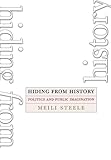Hiding from History : Politics and Public Imagination / Meili Steele.
Material type: TextPublisher: Ithaca, NY : Cornell University Press, [2018]Copyright date: 2005Description: 1 online resource (216 p.)Content type:
TextPublisher: Ithaca, NY : Cornell University Press, [2018]Copyright date: 2005Description: 1 online resource (216 p.)Content type: - 9781501717840
- 901
- D16.163 .S84 2005
- online - DeGruyter
| Item type | Current library | Call number | URL | Status | Notes | Barcode | |
|---|---|---|---|---|---|---|---|
 eBook
eBook
|
Biblioteca "Angelicum" Pont. Univ. S.Tommaso d'Aquino Nuvola online | online - DeGruyter (Browse shelf(Opens below)) | Online access | Not for loan (Accesso limitato) | Accesso per gli utenti autorizzati / Access for authorized users | (dgr)9781501717840 |
Frontmatter -- Contents -- Acknowledgments -- Introduction. The History Debates as a Crisis for Liberalism -- 1. Eliding Public Imagination: Habermas's Isolation of Principles from History -- 2. Avoiding Judgment: Structuralist and Poststructuralist Approaches to History -- 3. Reasoning through Public Imagination -- 4. The Politics of Race and Imagination: Arendt versus Ellison on Little Rock -- 5. Globalization and the Clash of Cultures -- Conclusion. Is There No Such Thing as Principle? -- Notes -- Works Cited -- Index
restricted access online access with authorization star
http://purl.org/coar/access_right/c_16ec
In Hiding from History, Meili Steele challenges an assumption at the heart of current debates in political, literary, historical, and cultural theory: that it is impossible to reason through history. Steele believes that two influential schools of contemporary thought "hide from history": liberal philosophies of public reason as espoused by such figures as Jürgen Habermas, Martha Nussbaum, and John Rawls and structuralism/poststructuralism as practiced by Judith Butler, Hayden White, and Michel Foucault. For Steele, public reasoning cannot be easily divorced from either the historical imagination in general or the specific legacies that shape, and often haunt, political communities.Steele introduces the concept of public imagination—concepts, images, stories, symbols, and practices of a culture—to show how the imaginative social space that citizens inhabit can be a place for political discourse and debate. Steele engages with a wide range of thinkers and their works, as well as historical events: debates over the display of the Confederate flag in public places; Ralph Ellison's exchange with Hannah Arendt over school desegregation in Little Rock; the controversy surrounding Daniel Goldhagen's book, Hitler's Willing Executioners; and arguments about the concept of a "clash of civilizations" as expressed by Samuel Huntington, Ashis Nandy, Edward Said, and Amartya Sen. Championing history and literature's capacity to articulate the politics of public imagination, Hiding from History boldly outlines new territory for literary and political theory.
Mode of access: Internet via World Wide Web.
In English.
Description based on online resource; title from PDF title page (publisher's Web site, viewed 26. Aug 2024)


